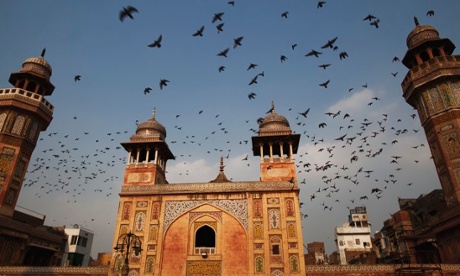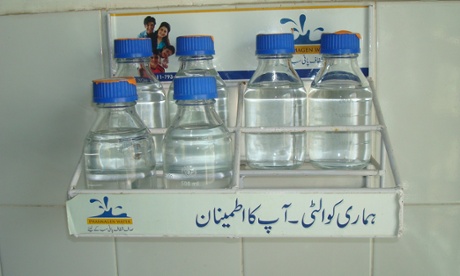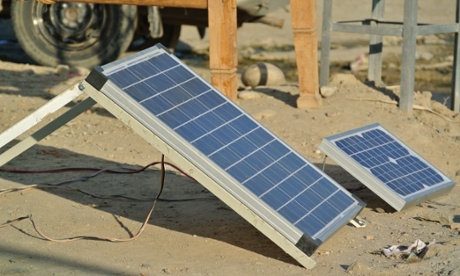 In Pakistan, new social enterprises hope to break the country’s reliance on international aid. Photograph: Daniel Berehulak/Getty Images
In Pakistan, new social enterprises hope to break the country’s reliance on international aid. Photograph: Daniel Berehulak/Getty Images
The term social enterprise may be relatively new in Pakistan but it is gaining popularity in its areas of development.
While it may be an unfamiliar concept for many engaged in local grassroots businesses they can nevertheless see the potential of engaging in ventures which have a social impact.
According to the Opportunity Pakistan Report – produced by i-genius, an initiative supporting social entrepreneurs worldwide – despite the country’s social and political unrest, it offers opportunities for investment and innovation.
“Countries experiencing transition are fertile places for new ideas to thrive”, said Shivang Patel, commission coordinator of i-genius. “Despite media attention in the west on all things bad in the region we found a country progressing through slow but significant positive reforms. There is considerable untapped potential for social businesses”.
A new wave of creative and confident young entrepreneurs has emerged developing innovative start ups in areas such as environment, health and skills. Scores of young women and men from remote areas of Pakistan are becoming social entrepreneurs.
A longstanding lack of investment in Pakistan’s public sector has prompted local business leaders to invest in ideas which tackle issues such as water and sanitation problems as well as those which can address its energy and environmental concerns.
Water
One such example is Pharmagen Water. Established in 2007,it aims to provide poor communities in Pakistan’s second largest city, Lahore, with affordable clean and purified drinking water. It is supported by theAcumen, which invests in entrepreneurs and creates venture capital which can provide solutions to causes of poverty.
 Pharmagen display. Photograph: Pharmagen
Pharmagen display. Photograph: Pharmagen“We have set up a chain of 17 shops at various less affluent areas of Lahore through which we are servicing 250,000 underprivileged people,” said the company’s CEO Parvez Sufi.
“Our water is purified with balanced minerals which is made using state of the art reverse osmosis purification process on international lines in accordance with the World Health Organisation standard”.
Energy
Another business offering a solution to parts of Pakistan’s energy strapped areas is SRE Solutions. Established just last year with Acumen’s support it offers to harness solar energy for off-grid customers in districts of Punjab and Khayber Pakhtunkhwa provinces.
 Solar panels form SRE Solutions. Photograph: Pindi Ghaip
Solar panels form SRE Solutions. Photograph: Pindi GhaipSophia Ahmed, business associate of Acumen’s arm in Pakistan explains, “Its solutions range from 5W-100W, integrating imported Chinese solar panels with DC based imported bulbs and fans. They offer a viable alternative to kerosene oil based lanterns currently being used in most of the remote off grid rural communities.”
Construction
Similarly a low-cost engineering and construction enterprise, Ghonsla, was set up in the aftermath of Pakistan’s devastating earthquake in 2005. With 73,000 people killed and large parts of its cities and villages destroyed in the north by the disaster, the plight of 2.5 million people left homeless hung in the balance.
While carrying out field work during this time Zehra Ali, the company’s founder, saw a demand for sustainable, greener insulation for the housing solutions being offered to those affected by the earthquake.
“Since our product is linked directly with making people’s homes more comfortable in the winter and reducing consumption of fuel wood, it provided a part of the solution to reducing indoor smoke,” Ali explained.
In the coming months she is looking into increasing production and collaborating with another insulation firm based in Germany while working locally to increase the company’s footprint in Pakistan’s northern district of Chitral, a scenic yet underdeveloped area bordering the Himalayas.
Finance
The initial funding for Ghonsla’s pilot project came from Seed, Social Entrepreneurship and Equity Development, a venture which supports startups and grassroots innovations.
Its incubation centres in Pakistan provide opportunities for young entrepreneurs in their early years of startup.
It was established by friends Faraz Khan and Khusro Ansari and runs five distinct projects, including StartUp Dosti, a business plan based competition for early stage startups in India and Pakistan. It seeks to build relationships between the next generation of entrepreneurs from the two countries and the wider South Asian diaspora. As part of this it also launched Pakistan’s first television programme closely based on the BBC’s Dragons Den format. It is to be aired in India and Pakistan in November.
Meanwhile a second conference is also being hosted by i-genius next month in Lahore to explore how social enterprise can transform Pakistan’s economic prospects.
Blanket foreign aid funding of development projects in Pakistan, often linked to its fortune in the world of geopolitics, does not go beyond crisis management. What is more likely to get results, as some of these initiates demonstrate, is incentivising the country’s base economies which can be run on sustainable social enterprise models and help it break away from the cycle of aid dependency.
Nishat Ahmed is a freelance journalist focusing on South Asian policy and development
http://www.theguardian.com/sustainable-business/2014/oct/10/social-...



You need to be a member of PakAlumni Worldwide: The Global Social Network to add comments!
Join PakAlumni Worldwide: The Global Social Network